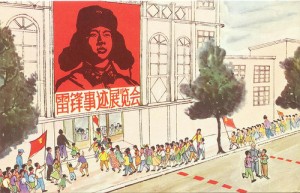April 10, 2013
Communist propaganda heroes and their political purpose, then and now.
Visiting the Exhibition of the Life of Lei Feng by Luo Jian-hua. Photo: Thomas Fisher Rare Book Library on Flickr.
There are certain dates that people prefer to forget, but political circumstances force them to remember. March 5 is such a day. It is the death-day of Joseph Stalin, and although responsible for the calamity of millions of Russians, Stalin’s admirers still laid flowers on his tomb at the Red Square during the 60th anniversary of his death. Among those present this year was the head of Russia’s Communist Party, Gunnady Zyuganov. Experts prognosticate, as far as there is no de-Stalinization process occurring, nor reflection of modern history in Russia, that many Russians will not be able to get rid of their illusions and continue to believe Stalin was the savior of their country.
March 5 also has some special meaning for the mainland Chinese. Half a century ago, on this day Mao Zedong wrote the sentence “Follow the example of comrade Lei Feng,” to baptize young Liberation Army soldiers.
Lei Feng (1940-1962) was an orphan from Hu’nan Province, who joined the Army at the age of 20 and died in an accident at 22. According to the official lore, after Lei’s death, people found his diary, which contained the passionate monologue of a youngster who had done many selfless, good deeds. But most importantly, the texts exposed his unconditional love and loyalty to the Communist Party of China and Chairman Mao.
The discovery of the diary coincided with a time when Mao’s authority was suffering enormously under the policies of the Big Leap Forward. After three years of famine that resulted in millions of deaths, Mao’s image and morals were severely damaged. The country slowly revived from the catastrophe only through Liu Shaoqi’s mild adjustment policy. Consequently, it was the proper moment to set up a legendary figure to divert the people’s attention. Right at this time Lei Feng and his diary emerged out of thin air and fit the pattern that the government sought—an orphan from Mao’s home province, a diligent worker, patriotic soldier, and obedient Maoist pupil. Feng’s legacy served as a perfect model for his compatriots to emulate. Thus, the propaganda machinery was turned on full-power to create a new revolutionary hero. Indeed, within a short time, Lei Feng became a posthumous national icon.
Despite his iconic status, there are several disputes about the credibility of Lei Feng’s existence, especially concerning his diary. Some believe General Lin Biao was working behind the scenes to re-establish Mao’s scraped image.
In their book, Sozialistische Helden: Eine Kulturgeschichte der Propagandafiguren (Socialist Heroes: A Cultural History of Propaganda Figures), historians Silke Satjukow and Rainer Gries explain that whether or not the stories about the heroes are true is besides the point. Heroic figures like Lei Feng were instruments of propaganda and served a political purpose.
For detail please visit here

